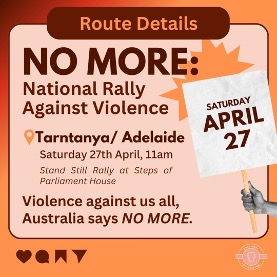As a Sexologist I speak to various topics of human sexuality. Today, I want to explain how an epidemic of violence against women is relevant to human sexuality, as well as offer support on how we can process the sad reality that Australia has a problem with men’s violence and be better allies.
Australia is experiencing an epidemic of men’s violence. Here’s how to be a good ally
It has taken me a week to comprehend the violence Australia witnessed at the Bondi Junction mass stabbing on Saturday the 13th of April.
Since writing this piece, I’ve had to edit it twice as there have been two new murders of women in Australia committed by ex or current partners.
National Rally Against Violence
Parliament House Steps
Saturday 27 April
11am – 1pm
The five horrific attacks and murders of women as well as a security guard in Bondi Junction committed by Joel Cuachi on Saturday the 13th have highlighted the extreme nature of an epidemic of violence from men, against women.
Over the past two months alone, we’ve had one woman murdered by her ex in Forbes NSW, another woman killed in WA by a partner who then killed himself, three women murdered in Ballarat VIC, a woman murdered in Scarsdale VIC, a woman murdered in Fortitude Valley QLD, a woman murdered in Broadwater WA and five women stabbed in Sydney, NSW.
The annual stats are also extremely grim.
Thirty women have been murdered this year in Australia already. One in four women will experience domestic violence at the hands of an intimate partner over her life and, on average, every nine days an Australian woman is killed by her intimate partner, according to Our Watch 2024. It’s also worth mentioning that the intersectionality of being queer, a woman of colour or trans means you’re subjected to higher rates of violence too.

Let’s widen the lens for a second.
Support services
Womens Safety Services South Australia
1800 800 098
Provides direct services and counselling for people who have experienced domestic or family violence
1800 FULL STOP AUSTRALIA
1800 385 578
(Provides 24/7, free and confidential trauma counselling for anyone in Australia affected by sexual, domestic and family violence
1800 RESPECT National Helpline
1800 737 732
24/7 hotline
Lifeline
24/7 crisis line
131 114
Yarrow Place Rape & Sexual Assault Services
Adelaide based
8161 7000
Human sexuality encompasses sex, gender, identity, relationships and love, sexual orientation and cultural, social and behavioural practices.
It includes the micro (your own unique sexual blueprint, how you live your sexual life and how you conduct your relationships) as well as the macro (culture, society and behaviour).
An epidemic of violence against women, by men, in a society that favours patriarchal power dynamics and toxic masculinity, directly affects our culture; how we operate, how we conduct relationships and how we live our lives.
A culture of Australian violence against women, impacts all of us, in one way or another.
Speaking of the Bondi murders is a cultural reflection of the systematic nature of men’s violence and our broader cultural issues of toxic masculinity and patriarchal power.
Even though the Bondi murderer was reportedly having a psychotic episode, this man was indoctrinated into a misogynistic society and learned to hate women throughout his entire life, so that when he finally snapped, the victims were women.
Rooted in patriarchal conditioning, our culture often steers cis men towards violence as a misguided outlet for their frustrations, leaving little room for healthy emotional expression.
This violent assertion of emotion (and power) reflects a deeply ingrained masculinity built upon the pillars of domination and control.
Yet, this violence only serves to obscure the true sources of their suffering.
Instead of scapegoating women for their struggles, we must empower men on the systemic injustices perpetuated by patriarchy and capitalism – the true architects of their loneliness, economic instability and emotional turmoil. Only by dismantling these oppressive structures can we hope to build a society where all individuals, regardless of gender, can thrive in safety and equality.
Read the entire back catalogue of On the Cusp here.
How to be a good ally
This is my love letter to men. If you’re feeling overwhelmed, get defensive when the conversations are brought up (aka “not all men”), or don’t know how to best offer support to your loved ones, these are some steps you can take to becoming a better ally:
- Hold Space for women: Ask the women in your life how they’re feeling about this issue. It sounds simple, however I could bet that most of you haven’t taken the time to see how the closest women in your lives (friends, partners, family) are actually feeling.
- Do you own research: There are a lot of great resources to help understand and educate yourself on the problem of men’s violence. Take the initiative to learn so you can be a part of the conversations more confidently.
- Call your friends out: When you see behaviours that affect a violent culture, call it out in the moment. Most of the time, it’s microaggressions that directly affect a culture of men’s violence. Catcalling, talking over women, sexism and misogynistic ideologies are all directly associated with the bigger problem.
- Have these conversations with your male friends: Start difficult conversations with your male friends about this issue. You mustn’t always rely on your female friends to do all of the emotional labour.
Want to do more? There is a Violence against women rally happening this Saturday the 27th of April at Parliament House. Show up, stand up and help fight against men’s violence.




